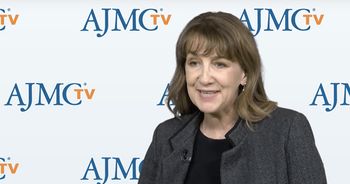
For patients with multiple sclerosis (MS), upper extremity (UE) impairment is not uncommon, and patients with primary progressive MS tend to have a higher prevalence of UE dysfunction and greater impairment.

Laura Joszt, MA, is the vice president of content for the managed care and pharmacy brands at MJH Life Sciences®, which includes The American Journal of Managed Care®, Managed Healthcare Executive®, Pharmacy Times®, and Drug Topics®. She has been with MJH Life Sciences since 2011.
Laura has an MA in business and economic reporting from New York University. You can connect with Laura on LinkedIn or Twitter.

For patients with multiple sclerosis (MS), upper extremity (UE) impairment is not uncommon, and patients with primary progressive MS tend to have a higher prevalence of UE dysfunction and greater impairment.

Pediatric patients with early-stage Hodgkin lymphoma who are treated with chemotherapy followed by radiotherapy, known as combined modality therapy, have an improved 5-year survival rate compared with patients treated with chemotherapy alone.

January 4 marks the anniversary of the Orphan Drug Act, which was enacted in 1983. Since the law was passed, it has successfully encouraged more orphan drug development, but some now say drug makers are manipulating the system and the incentives need to be revisited.

Hospitals that are participating in Medicare’s mandatory bundled payment model for hip and knee replacements reported a decrease in spending per episode of $812 compared with control hospitals not participating in the Comprehensive Care for Joint Replacement (CJR) program.

An evaluation of cognitive function measurements, performance in daily activities, and the perception of cognitive functions in patients with multiple sclerosis (MS) found caregiver perceptions more closely correlate with the test measurements than patient perceptions.

Patients who are treated with chemotherapy for their solid tumors have an increased risk of therapy-related myelodysplastic syndrome and acute myeloid leukemia (tMDS/AML) despite advances in chemotherapy regimens, according to a new study in JAMA Oncology.

The Hospital Readmission Reduction Program was announced as part of the Affordable Care Act and penalized hospitals for higher-than-expected 30-day readmissions. However, new research finds that the policy may have done more harm than good with postdischarge mortality increasing for Medicare beneficiaries hospitalized for heart failure and pneumonia.

Mature oligodendrocytes have been overlooked in the past as a way to treat multiple sclerosis, but a new study has found they might be able to help with remyelinating axons the same as new oligodendrocytes.

The practices that have been participating in CMS’ Oncology Care Model have undergone significant practice transformation in order to be successful in the program. However, even after being in the model for 2 years, there are still remaining opportunities for investment.

Patients with multiple sclerosis (MS) who also have food allergies have more relapses than patients with no known food allergy, according to a new study published in the Journal of Neurology, Neurosurgery & Psychiatry.

Throughout the year, The American Journal of Managed Care® (AJMC®) offered a number of video programs, including Peer Exchange discussions and interviews, on a range of topics. Here are the most-watched videos published by AJMC® in 2018.

Health providers are taking a serious look at loneliness because of the health implications. A new program from CareMore Health that tackles loneliness has shown positive health outcomes after 12 months.

Practices participating in the Oncology Care Model have now received performance results for 2 periods, and many practices were surprised that they didn’t perform as well as expected. In general, some of the practices have found it difficult to predict success in the model, but there have been positive results from the OCM.

After growing modestly between 2011 and 2016, the average premium for employer health plans rose sharply in 2017, growing 5.5% from 2016 to 2017 for family plans and 4.4% for single-person plans.


Recap of the November 7 meeting of The American Journal of Managed Care®’s The Institute for Value-Based Medicine®. The dinner discussion, “Advancing Quality in Oncology Care” was held in Seattle, Washington.

While the Oncology Care Model is likely not a sustainable mode for oncology care, it will probably inform what payment structure comes next.

Lifestyle factors like exercise, meditation, and alcohol use were inversely associated with depression risk, while smoking significantly predicted depression.

Just because a patient nods and does not ask any questions during a health encounter, does not mean that patient truly understands the information that was communicated. Providers need to examine how they are delivering that information, what terminology they are using, and whether they are checking patients truly understand what they were told.

In fiscal year 2019, there will be approximately $1.9 billion in value-based incentive payments available to hospitals in the Hospital Value-Based Purchasing (VBP) Program, which is a budget-neutral program.

The FDA has issued a safety warning that patients who stopped taking Gilenya experienced worsening of multiple sclerosis, compared with before treatment started or during treatment, in rare cases.

Once-daily gilteritinib pills have been approved to treat adult patients with relapsed or refractory acute myeloid leukemia (AML) with a FLT3 mutation. Approximately 25% to 30% of patients with AML have this mutation, which is associated with an aggressive form of the disease and carries a higher risk of relapse.

New reports from the CDC have highlighted troubling increasing trends in suicides and drug overdose rates as life expectancy in the United States declined.

The lag time between the end of a performance period in the Oncology Care Model (OCM) and the release of the full report from CMS, represents a challenge for practices looking to improve.

CMS is moving home health agencies away from a volume-based payment model and to a new value-based payment system. The Patient-Driven Groupings Model would focus on patient needs and rely more heavily on patient characteristics in order to pay for home health services.

FDA has recently approved 2 new treatments for patients age 75 and older who are newly diagnosed with AML and have other chronic health conditions or diseases that may mean they cannot use intensive chemotherapy.

Chronic diseases remain a significant challenge for older Americans, and Humana is using a holistic approach, leveraging value-based reimbursement models, to improve health outcomes and quality measures for the insurer’s Medicare Advantage (MA) members, according to a new Humana report, “The Intersection of Health + Care.”

Patients who have migraine often suffer from coexisting issues, such as sleep difficulties, vertigo, and dizziness. A study evaluating the presence of certain symptoms in patients with migraine indicated that some may have a common pathophysiology.

A new investigational drug has demonstrated high response rates in patients with a rare but highly aggressive blood disease that currently has no approved therapies, according to new research led by investigators at The University of Texas MD Anderson Cancer Center.

HHS Secretary Alex Azar plans to ensure his agency handles both the health and the human services, as stated in its name, of Americans. In a recent speech, he hinted that the Center for Medicare and Medicaid Innovation will be doing more work in areas adjacent to healthcare, such as food insecurity, and housing, utility, and transportation needs.

259 Prospect Plains Rd, Bldg H
Cranbury, NJ 08512
© 2025 MJH Life Sciences®
All rights reserved.
